
 


 | |
|
Spain & Portugal 2002
In april & may of 2002, Eric and I drove down to Portugal
and Spain for a two-week vacation. We spent the first week
at the beach near Monte Gordo, in the Portuguese
Algarve, at just a few kilometers from
the Spanish Border. In the second week, we visited
Granada (with the famous Alhambra
palace) and Barcelona,
in Spain. You can find some practical info on this trip in
general on this trip's home page.
Other links for this trip: Granada, Spain The Alhambra, in Granada, is a place that's absolutely worth visiting. A large part of Spain was ruled by Moorish kings (emirs) for several centuries, around the Middle Ages, and the Alhambra was their palace. From it, they ruled their "Kingdom of Granada." Note that from what I understood, the Moors were Muslims, but they had been Spaniards for several generations; they were not Arabs. 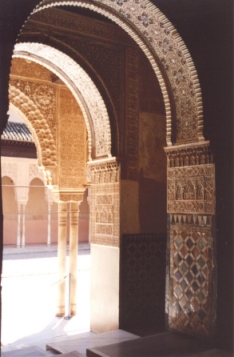
The most impressive part of the Alhambra is the Royal Palace, or Casa Real. Note that you need tickets to visit here, which you pick up further uphill at the ticket office. These tickets can be reserved in advance, through the internet, or by phone, and I strongly - very strongly - suggest you do so. We hadn't, and spent nearly two and a half hours waiting in line, while hordes of obnoxious French tourists kept cutting in and joining the line close to the end. Other info on getting tickets is found here; you can reserve tickets from one year to one day before your actual visit. The tickets give you a window of half an hour in which you're allowed to enter the palace. After entering, you can spend as much time there as you like. Here's a little reward for those of you who read down this far: after having visited the palace at our appointed visiting time, we went back in through the rear entrance (near El Partal) several hours later, so we got a chance to see the palace in the early evening sunlight as well. 
My favorite part of the Royal Palace was the fantastic Court of Lions, or El Patio de los Leones, shown in the photograph above. This was the residential area of the Nasrite emirs, and was built from the 14th century onward. The first photograph on this page shows an archway into a room off the Court of Lions. 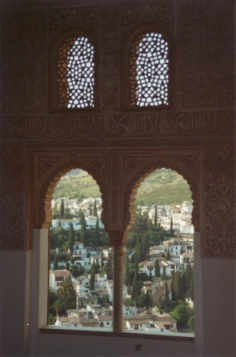
Any attempt of mine to describe the palace is doomed to fail. I can't bring across the feel of the place, the beautiful arches, the delicacy, the incredibly detailed artwork that decorates every nook and cranny. And the photographs on this page have been brought down in resolution so far that they just barely give an impression. Take a look at the photo below, and imagine that every little bit of ceiling, wall, and floor is decorated in such detail, with woodcarvings, marble, or mosaics. 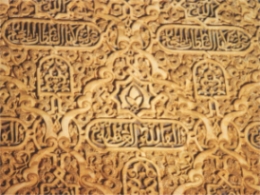
The photograph below shows a few of the towers of the Alcazaba. This is the oldest part of the Alhambra, and was a fortress, built on the ruins of an even older castle. It was the residence of the first of the Nasrite kings, Muhammad ben Nasr al-Ahmar, from the early 13th century. 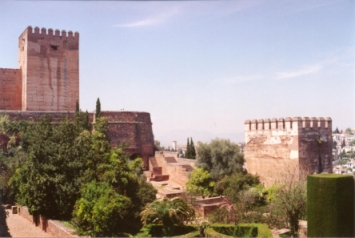
The Catholic monarchs Ferdinand (Fernando) and Isabel conquered Granada in 1492, and chased away the Moors. From that time on, the Alhambra was inhabited off and on by Catholic kings & queens, and they added a number of buildings to the complex. Luckily, they left most of the Moorish buildings intact, so we can compare them and note the lack of grace and delicacy in the Catholic buildings. The largest of the Catholic buildings is the palace built by Charles V, shown below. 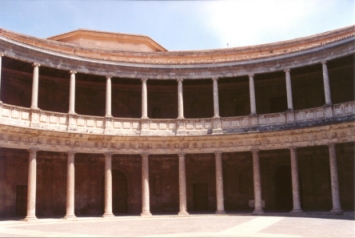
The Generalife is where the emirs and their families went on "summer vacation"; it's a couple of buildings set in beautiful gardens. Nowadays, the Generalife is connected to the rest of the Alhambra with a walkway, but apparently it was a much longer trip about 7 centuries ago. The photo below shows an overview of the Alhambra, taken from the hill above the Albaicin. 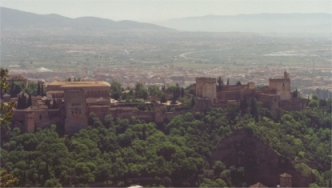
For more information on the Alhambra and Granada, try a search on "alhambra," "granada," and "lions," and you'll be swamped with pages. Some of the most useful are one on the history of the Alhambra from the city of Granada, the official Alhambra Y Generalife website, and a wordy one, but with nice pictures, which " showcases Spain's Moorish past." | |
|
Judith's |Home| |Nepal| |Sweden| |Canada| |cycling to Spain| |Australia| |